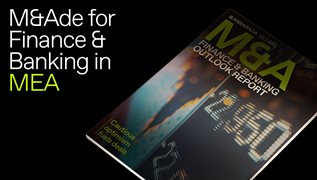The rise of cross-border M&A in the Middle East: How deal technology can help
The Middle East has emerged as a global M&A hotspot, with cross-border transactions driving growth in the region.
By AnsaradaFri Jul 25 2025Mergers and acquisitions, Industry news and trends, Innovation

As sovereign wealth funds, corporates, and private equity firms increasingly look beyond their borders for strategic opportunities, the complexity of international deals has created new challenges that technology is uniquely positioned to solve.
The cross-border M&A boom
The numbers tell a compelling story of international expansion. Recent data shows that Middle East M&A value surged 52% to reach $29 billion in 2024, with Saudi Arabia and the United Arab Emirates leading the charge. This momentum has continued into 2025, with Q2 2025 data from Mergermarket revealing robust activity across multiple markets, generating $4.9 billion in total deal value across 113 transactions.
Cross-border activity has become particularly pronounced in the Asia-Pacific corridor. Dealmaking by Middle Eastern companies targeting the APAC region posted an all-time high value in 2023 – a total of US$12 billion, demonstrating the region's growing appetite for international expansion.
The strategic drivers behind this cross-border surge are clear. Economic diversification initiatives, particularly Saudi Arabia's Vision 2030 and similar programs across the Gulf states, are pushing regional players to acquire capabilities and expertise from international markets. Meanwhile, sovereign wealth funds and government-related entities were the driving force behind much of this activity, leveraging their substantial capital reserves to pursue transformational deals globally.
Regional M&A activity reflects cross-border ambitions
The broader Middle East M&A market in Q2 2025 demonstrates the foundation for increased cross-border activity. Total regional deal activity reached $4.9 billion across 113 transactions according to Mergermarket, with the Technology sector leading at $1.4 billion across 34 transactions, reflecting the region's digital transformation priorities that are driving international partnerships and acquisitions.
Energy & Natural Resources generated $1.8 billion in total regional deals, a sector where Middle Eastern companies are increasingly looking beyond their borders for renewable energy and energy transition assets. Financial Institutions showed robust activity with $1.8 billion across 13 transactions, as regional banks and fintech companies build the capabilities needed for international expansion.
The geographic complexity challenge
As Middle Eastern companies expand their deal horizons across borders, they face complexity. A single transaction might involve due diligence teams in Dubai, legal counsel in London, target companies in Singapore, and regulatory approval processes across multiple jurisdictions. This complexity is compounded by:
-
Time zone challenges: Deals spanning from the Middle East to Asia-Pacific or the Americas require coordination across 12+ hour time differences, making traditional collaboration methods obsolete.
-
Language barriers: Cross-border transactions often involve documentation in multiple languages, creating translation bottlenecks that can delay critical decision-making.
-
Cultural nuances: Understanding local business practices, regulatory requirements, and cultural sensitivities becomes crucial for successful deal execution.
-
Regulatory complexity: Each jurisdiction brings its own compliance requirements, data protection laws, and approval processes.
Technology as the solution
Modern deal technology has evolved to address these exact challenges, transforming how cross-border M&A is executed. Virtual data rooms (VDRs) have become the backbone of international dealmaking, and platforms like Ansarada are leading the way with capabilities specifically designed for the complexities of cross-border transactions.
AI-powered translation and communication
Ansarada is an advanced VDR that incorporates AI-translation capabilities that can instantly convert documents between Arabic, English, Mandarin, and dozens of other languages. This eliminates the weeks-long delays traditionally associated with professional translation services while maintaining the accuracy required for complex financial and legal documents.
For a Saudi company acquiring a Chinese technology firm, Ansarada's AI-Translate features mean that due diligence can proceed simultaneously in both languages, with deal teams able to review translated documents in real-time and flag discrepancies immediately.
Enhanced security for international transactions
Cross-border deals involve heightened security considerations, particularly when sovereign wealth funds or government-related entities are involved. Ansarada offers bank-grade security and has been ISO 27001 certified for over 10 years, detailed audit trails, and granular permission controls that meet the stringent requirements of international regulatory bodies.
Ansarada's geographic restrictions and data residency controls ensure sensitive information remains within approved jurisdictions, while advanced authentication methods protect against unauthorised access across multiple countries.
The competitive advantage
Regional players who leverage advanced deal technology like Ansarada gain significant competitive advantages in international markets. Faster due diligence processes, more efficient communication, and reduced translation costs all contribute to more attractive deal terms and shorter execution timelines.
Consider the recent trend of ADNOC Logistics and Services' purchase of an 80% stake in Singapore-based Navig8, valued at US$1 billion. Such complex international transactions require seamless coordination between multiple jurisdictions, regulatory bodies, and stakeholder groups – exactly the scenario where advanced deal technology provides maximum value.
Looking forward: Technology-enabled growth
As the Middle East continues its economic transformation, cross-border M&A will only intensify. The region's strategic position between East and West, combined with substantial capital reserves and diversification imperatives, creates ideal conditions for sustained international dealmaking.
The companies that will thrive in this environment are those that recognize technology as a strategic enabler rather than a back-office function. By investing in advanced deal platforms that offer AI-powered translation, global collaboration capabilities, and enterprise-grade security, they position themselves to compete effectively in the global M&A arena.
The Mergermarket Q2 2025 data clearly shows that Middle Eastern companies are already embracing international expansion with unprecedented vigor. Those who pair this strategic vision with cutting-edge deal technology will be best positioned to capture the opportunities that lie ahead in an increasingly connected global economy.
The future of Middle Eastern M&A is cross-border, and the organizations that master the technology of international dealmaking will write the next chapter of regional economic transformation.


